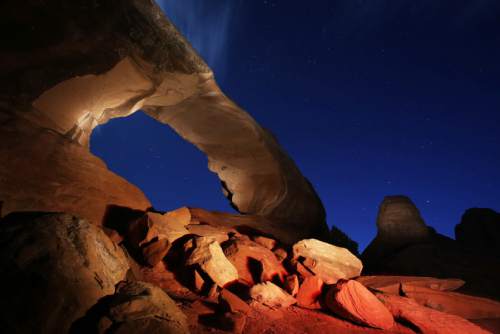This is an archived article that was published on sltrib.com in 2016, and information in the article may be outdated. It is provided only for personal research purposes and may not be reprinted.
Utah's elected leaders are all about local control, local decision-making and local input into decisions made by the federal government.
Until they aren't.
The official reaction from the administration of Utah Gov. Gary Herbert to the locally driven Moab Master Leasing Plan demonstrates that what the governor is mostly in favor of is digging holes. Even in places that local leaders would rather leave in more or less pristine shape for the benefit of future generations — and existing recreation opportunities.
Many Moab-area stakeholders are happy with a plan than doesn't shut down energy development but does recognize the need to preserve sensitive lands, both for their own sake and for the benefit of the area's booming recreation economy.
But, according to the statement from Kathleen Clarke, the governor's public lands policy director, all the Herbert administration sees are unnecessary limits and controls on anyone, local or from far away, who wants to drill.
Master leasing plans, such as the Moab-area one the Bureau of Land Management has just put out for public comment, are a new idea designed to take a more comprehensive look at how to handle all the competing demands on limited and, often, vulnerable lands the government holds in trust for all the people of the United States, current and future.
The draft Moab MLP grandfathers oil drilling rights already leased on 228,000 of the 785,000 acres covered, all in the neighborhood of Arches and Canyonlands national parks. But it also would bar leasing on 145,000 acres and require any oil and gas development on 306,000 acres to be done from a distance, so that the surface is not disturbed.
The plan had considerable input from people who actually live, work, run businesses and hold public office in Moab and Grand County. Those folks understand the need to develop energy resources.
But they also know — or at least have reason to hope — that the future of their community will move away from the inevitable boom-and-bust nature of the extractive economy and embrace its future as a hub of outdoor recreation that draws money-spending visitors from the world over.
No, those jobs won't pay nearly what a skilled roughneck would make punching holes in the red earth. But they won't dry up in the next oil glut, either, or leave behind a squeezed-out husk of a county.
The whole drive by Herbert and others in state government to increase state dominion over public lands is seriously, if not fatally, undermined by a protest that local input is only to be taken seriously when it favors the oil business, and to be dismissed when it values anything else.



